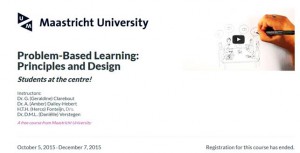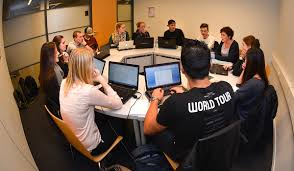Students at the centre!

Maastricht University (UM) has a strong tradition in Problem-Based Learning (PBL), focussing on small-group learning centered around authentic problems. At first sight, this is in contrast with the large-scale and often teacher-driven set-up of MOOCs. UM is, however, interested in exploring the potential of online PBL and the potential of MOOCs. To gain first-hand experience and to explore implications for UM staff and students UM developed a MOOC about PBL which is designed –as far as possible in the setting of a MOOC- in line with modern learning principles that are also at the basis of PBL: constructive, contextual, collaborative and self-directed learning: Problem-Based Learning: Principles and design. Students at the centre!
A university-wide project team, consisting of 34 people from all faculties, was responsible for this innovative MOOC design. The course is centered around a set of authentic problems organized in three different tracks:
- The role of the tutor in PBL
- Designing PBL problems and courses
- Assessment and organisational aspects of PBL
Participants work in groups on authentic problems in a similar way as face-to-face PBL tutor groups, except that they work online and do not have a tutor.
“UM MOOC Problem-Based Learning: Principles and Design” verder lezen


